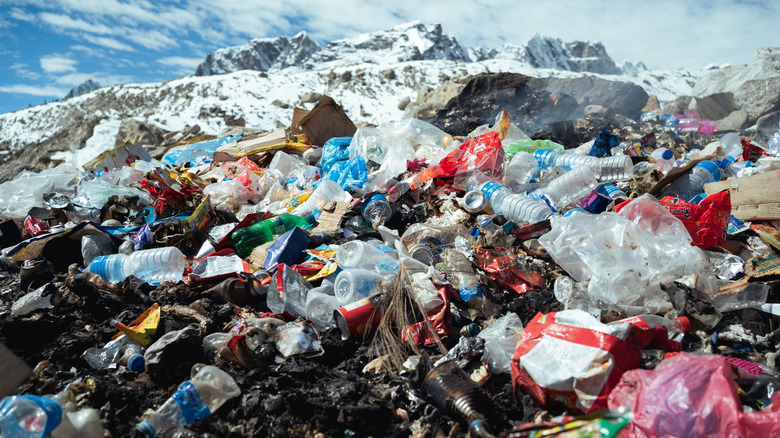What Do Grocery Stores Really Do With Expired Food?
There's a seemingly endless amount of food at American supermarkets, and it's rare we're not able to find something we need. While those bountiful shelves are convenient for customers, all that food can't possibly be picked up before expiry. Even if grocery stores do intensive research to estimate consumer demand, or employ the help of AI to predict purchase trends, the math isn't going to be perfect. Most stores still overbuy groceries to keep customers happy. That leaves us all asking that one big question: What do grocery stores do with all their leftover food?
Well, when a food item is approaching its expiration or sell-by date, most grocery stores will move the product into the clearance section with the hope that customers will snag it fast. If these items aren't added to cart in time, some commercial grocery chains, like Food Lion, Sam's, and Trader Joe's, donate leftover food to local food banks to further reduce waste. Whole Foods donated over 30 million meals to those in need in 2022, and Walmart (the largest grocery store chain in the U.S.) more than 696 million pounds. Even if a food item is past its sell-by date, most companies choose that date based on when a product will taste best, not when it will actually expire. After all, there are some foods that actually don't expire at all. So stores can still bring that food to food banks to distribute to the local community. Since food banks are trained in food safety, they can distinguish the good food from the expired.
35% of surplus food makes it to the landfill
If a food item's time has really passed, and it's no longer considered edible, heading to a landfill is still technically a last resort. Instead of hitting the bin, it's likely this food will be composted or donated to local farmers to use in animal feed. Other food items are donated to special organizations that will burn and convert the food's gasses into energy.
If the time for all these options has passed, we've finally reached the period where the food is thrown away. Sometimes this just has to happen, but some retailers really prefer this method, as landfilling is typically a cheaper option than composting or otherwise. According to the nonprofit organization ReFED's reports, this means that 35% of surplus grocery store food was still wasted in 2023 — although some major retailers like Walmart have set goals to become zero-waste in the future.
While some stores might throw expired food into the trash at the end of the night, there are those that try to save what's left. Still, we clearly have a long way to go before we can fully reduce food waste at American supermarkets.

